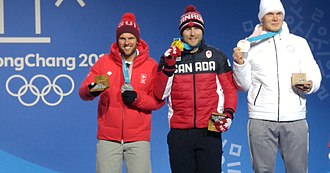| 2018 Winter Olympics medals | |
|---|---|
 Marit Bjørgen (pictured) won five medals at the 2018 Winter Olympics, the most of any competing athlete. | |
| Location | Pyeongchang, |
| Highlights | |
| Most gold medals | |
| Most total medals | |
| Medalling NOCs | 30 |
| Part of a series on |
| 2018 Winter Olympics |
|---|
The 2018 Winter Olympics, officially known as the XXIII Olympic Winter Games, were an international winter multi-sport event held in Pyeongchang County (stylized as PyeongChang for the games), South Korea, from 9 to 25 February, with preliminary events in some sports beginning on 8 February. [1] [2] [3] A total of 2,833 athletes representing 92 National Olympic Committees (NOCs) participated. [4] The games featured 102 medal events in 15 sports, making it the first Winter Olympics to surpass 100 medal events. [5] [6] Four new disciplines in existing sports were introduced to the Winter Olympic Games program in Pyeongchang: big air snowboarding, mixed doubles curling, mass start speed skating, and mixed team alpine skiing. [7]
Contents
Athletes representing 30 NOCs received at least one medal, the highest for any Winter Olympic Games thus far, with 22 NOCs winning at least one gold medal. [8] [9] Athletes from Norway won the most medals overall, with 39, surpassing the previous record of 37 medals set by the United States at the 2010 Winter Olympics. [10] Athletes from Germany and Norway tied for the most gold medals with 14 each, equaling the record set by Canada in 2010 for most gold medals won at a single Winter Olympics. [11] Hungary won its first Winter Olympic gold medal ever, doing so in the men's 5,000 meter short-track speed skating relay. [12]
Norwegian cross-country skier Marit Bjørgen won the most medals at the games with five (two gold, one silver, and two bronze). [13] With 15 total Olympic medals, she also became the most decorated athlete in Winter Olympics history. [14]

